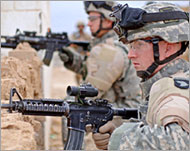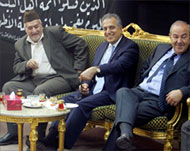American unease over Iraq grows
As the third anniversary of the war in Iraq approaches, the American public is showing growing unease at the relentless violence and political instability plaguing the country.

The creation of the first post-Saddam permanent government in Iraq coupled with Congressional elections in November mean 2006 is a make-or-break year for US foreign policy in the Middle East.
But after three years of a continued military presence in Iraq, the public is growing impatient and calling for troops to come home.
According to a Zogby poll published last week, 72% of US forces in Iraq believe the US should be out by year’s end. Other polls put Bush’s popularity rating between 34% and 41%.
Discontent with the outcome of the war is a major factor in Bush’s slumping approval ratings. The latest example of this downturn is the death of US hostage Tom Fox, one of four kidnapped Christian peace activists.
Impeachment?
Outgoing editor of Harper’s magazine, Lewis Lapham, who recently criticised Bush for being “a televangelist who engages the United States in a never-ending crusade against all the world’s evil”, told Aljazeera.net the president should be impeached.
“He’s done a lot of harm to the United States as opposed to the well being of the American people and the Iraqi people,” he said.
“The war will show up as the perpetration of a criminal fraud. He is a criminal known to be armed and shown to be dangerous. The impeachment is to simply prevent him from doing further harm to the United States.“
|
“In a sense we don’t really know what we’re doing” Kenneth Pollack, |
Impeachment momentum has been building since June 2005 when John Conyers, a Michigan Democratic Congressman, and 12 other members of Congress delivered a petition signed by 560,000 people demanding Bush address why the country went to war.
James Zogby, founder and president of the Arab American Institute, says the Bush administration has made terrible miscalculations.
“I think this war was badly planned from the beginning but not understanding the consequences, not realising that when you take the lid off this box, you had better be prepared for the consequences of civil war,” he said.
“It’s the darkest hour I can recall of our country’s relationship with the Middle East and it’s all because of this administration”
Disillusioned
Three years on, there have been more than 2300 US military fatalities in the war, with about 17,000 troops wounded in action.
More than 200 foreigners and thousands of Iraqis have been kidnapped since the March 2003 US-led invasion. Dozens of journalists, mostly Iraqi, have been killed covering the war.
 |
|
Polls say 70% of Americans have |
Former US military serviceman Rafael Noboa, 29, says he is disillusioned by his tour serving in Iraq.
“It’s great that we built all these schools, we painted them and installed brand new desks. But you know what? The school doesn’t do the kids any help if they’re too scared to walk home from the school because they’re afraid of being killed.”
Thomas Lippman, former editor of the Washington Post, believes the invasion of Iraq was really not necessary to American national security and is not surprised by Bush’s unpopularity.
“I would attribute it to the deep disaffection of the president’s conservative base because he’s turned out to be a big government big spender.”
Asked if he thought the US should pull out, he replied: “If we don’t keep them there, there will be a civil war.”
Significant transition
In the wake of the bombing of a shrine sacred to the Shia community in Sammara, north of Baghdad, sectarian revenge killings raged, prompting fears of an impending civil war.
According to the latest AP-Ipsos poll, nearly four out of five Americans, including 70% of Republicans, believe civil war will break out in Iraq.
In the first in a series of planned speeches aimed at rallying support for the war, Bush delivered called on Iraqis to embrace compromise as they negotiate a new unity government and asked Americans to show patience amid “images of violence and anger and despair”.
 |
|
2006 could prove to be a crucial |
He refused to set a deadline for withdrawing troops from Iraq and said the US military were instrumental in training Iraqi security forces.
Senators recently voted that 2006 “should be a period of significant transition to full Iraqi sovereignty”, with Iraqi forces taking the lead in providing security to create the conditions for the phased redeployment of US forces.
But the news from Iraq continues to be troubling – and embarrassing – for the administration’s plans.
Last week, 50 security guards were kidnapped by armed men wearing Iraqi police uniforms amid US allegations that death squads were operating within the Iraqi Interior and Defence ministries.
Despite all the setbacks, Donald Rumsfeld, the US defence secretary, speaking before Congress, said Iraq‘s security forces, not US soldiers, would be able to handle an outbreak of civil war, should one occur.
High-risk venture
Graham Allison, former assistant secretary of defence in the first Clinton administration and a leading analyst of US national security and defence policy, says the administration’s plan is a high-risk venture that is likely to fail rather then succeed.
“The failure to send enough troops to stabilise the situation after toppling Saddam was a huge mistake. It allowed the insurgency to be rampant. And the belief that they can establish a democracy in just a few years given the divisions amongst the Sunnis and Shias was a folly,” he told Aljazeera.net.
 |
|
Iraqi politicians have failed to |
Many analysts have questioned how capable Iraqi security forces would be without the aid of US troops, the degree to which they are loyal to the central government and how deeply they have been infiltrated by militia.
Kenneth Pollack, director of research at the Brookings Institution, believes 2006 will be a make-or-break year for Iraq.
“I think 2006 is critical because of public opinion in both the United States and Iraq,” he said.
“I think it’s very clear – from all the polls that we are seeing – that while the American public remains committed to the idea that reconstruction of Iraq is critical to US security, there’s a growing unease with the course of reconstruction.
“In a sense, we don’t really know what we’re doing.”